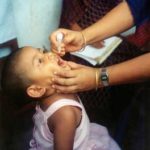1. Health Economics for Vaccines
 The process of creating vaccines, manufacturing, distributing, and injecting them into individuals is a complex process requiring multiple decisions by multiple groups and individuals. On the supply side there are pharmaceutical companies, regulatory authorities, distributors, and thousands of health care workers who have to make strategic choices. On the demand side there are parents, relatives, friends, and their social network who have to choose to receive a vaccine and the scheduled boosters. After they receive a vaccine, they may or may not change their exposure to risks of disease.
The process of creating vaccines, manufacturing, distributing, and injecting them into individuals is a complex process requiring multiple decisions by multiple groups and individuals. On the supply side there are pharmaceutical companies, regulatory authorities, distributors, and thousands of health care workers who have to make strategic choices. On the demand side there are parents, relatives, friends, and their social network who have to choose to receive a vaccine and the scheduled boosters. After they receive a vaccine, they may or may not change their exposure to risks of disease.
The field of economics can be helpful at understanding decisions related to supply and demand. Economics focuses on choice under uncertainty. This course will review the relevant components of economics that can help inform decisions that drive the supply and demand for vaccines. There is a common misconception that economics is only relevant to goods that trade on the private market-and vaccines are heavily subsidized and provided publicly in most cases. However, the principles of supply and demand still apply to publicly provided goods and the economic principles are enriched by the need to understand how these private decision impact the entire public.
2. Costing in Vaccine Planning and Programming
 Costs and costing information is an important and useful input to the routine planning, budgeting, management, and implementation or rollout of an effective immunization program. This information is also needed when conducting economic evaluation studies to determine what, when and how to introduce new vaccines or which implementation approach/strategy would achieve better and effective coverage. The costs are not generalizable from one country to another as vaccine schedules, target populations, strategies etc. vary by country. For this reason, costs are country-specific and should be obtained and estimated locally.
Costs and costing information is an important and useful input to the routine planning, budgeting, management, and implementation or rollout of an effective immunization program. This information is also needed when conducting economic evaluation studies to determine what, when and how to introduce new vaccines or which implementation approach/strategy would achieve better and effective coverage. The costs are not generalizable from one country to another as vaccine schedules, target populations, strategies etc. vary by country. For this reason, costs are country-specific and should be obtained and estimated locally.
This course provides information on the cost profiles of routine immunization programs and supplementary immunization activities (SIA) using different country examples. We will learn how to cost existing programs, specific interventions, new vaccine introduction, and possible data sources to conduct such analysis and how to report and use the results for policy decisions.
3. Economic Evaluation of Vaccines and Vaccination Programs
 Economic evaluation studies are conducted to determine what, when and how to introduce new vaccines or which implementation approach/strategy would achieve better and effective coverage. This course will enable students to have a solid introduction to the theory, methods, and application of economic evaluation in health care with a specific focus on decision analysis and cost-effectiveness analysis. alternative approaches of modeling research questions for these fields. Approaches include calculation of costs and effectiveness measures using standard modeling methods. Compares outputs as a result of decision tree and Markov modeling and introduces sensitivity analysis.
Economic evaluation studies are conducted to determine what, when and how to introduce new vaccines or which implementation approach/strategy would achieve better and effective coverage. This course will enable students to have a solid introduction to the theory, methods, and application of economic evaluation in health care with a specific focus on decision analysis and cost-effectiveness analysis. alternative approaches of modeling research questions for these fields. Approaches include calculation of costs and effectiveness measures using standard modeling methods. Compares outputs as a result of decision tree and Markov modeling and introduces sensitivity analysis.
